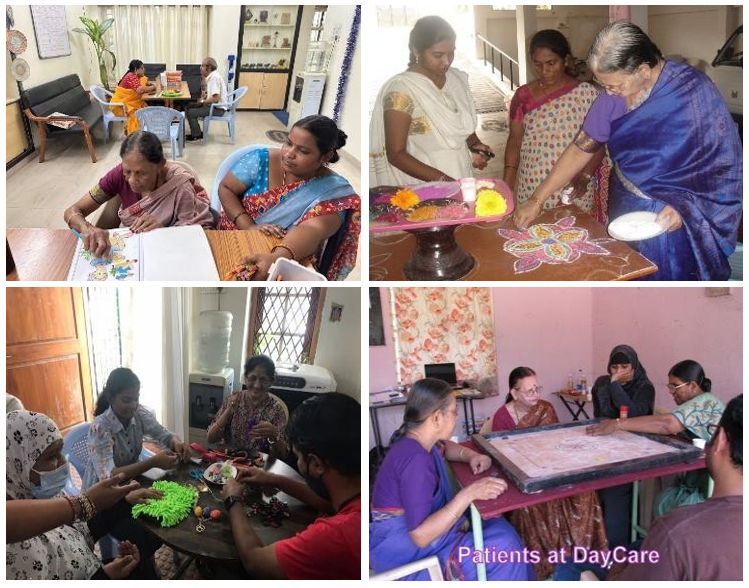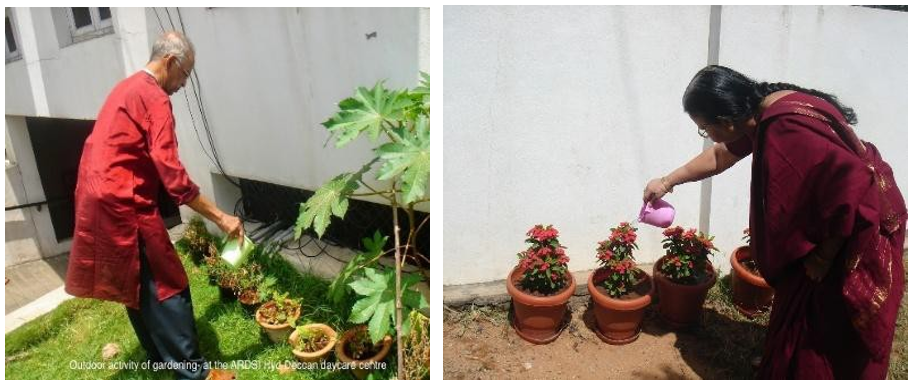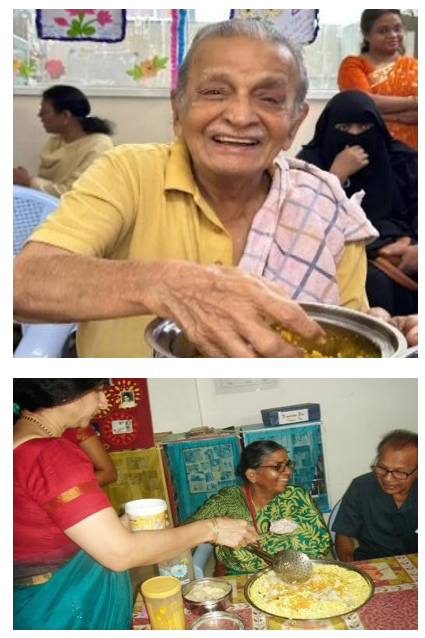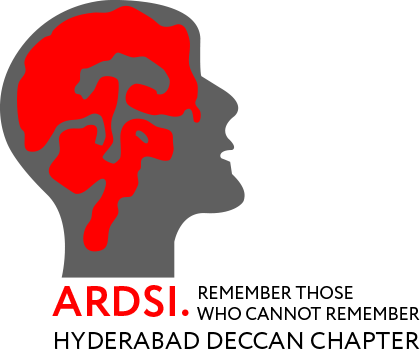- Phone: +91-9121106681
- Email: ardsihyd@gmail.com
Dementia Treatment
Dementia as on date has no single drug to cure the underlying brain disease and reverse the changes that have already happened in the brain. But some may help with some of the symptoms for a time. Dementia medications can help to slow down the decline in a person’s cognition (their ability to think, understand and remember). They may help with reducing anxiety, improve concentration and mood elevation in the early and middle stages.
The medications generally used in the treatment of dementia can be categorised as follows:
· Drugs that can help in moderating the symptoms that arise from cognitive impairment.
· Drugs that can help in modifying the chemical processes leading to brain degeneration.
· Drugs that can help in controlling the behavioural and psychological symptoms.
· Drugs that can help to control the existing co-morbidities – hypertension, diabetes, cardiovascular disease.
Cholinesterase Inhibitors:
These drugs increase levels of acetyl choline, a chemical messenger in the brain that helps the nerve cells to communicate among themselves and also coordinate with the muscles and glands in the body.
Acetylcholine plays a key role in many bodily functions that include: make skeletal muscles and smooth muscles to contract; modulates heart rate; dilates blood vessels; Causes glands to secrete substances such as tears, saliva, milk, sweat and digestive juices; Controls the release of urine and causes erection.
Acetylcholine helps in memory, learning, and activation of the brain cortex. In the short term, acetylcholine helps you hold onto information in your working memory so that you don’t forget it as soon as you hear it. The neurotransmitter also helps your brain organize and code important information in your long-term memory.
An enzyme called acetylcholinesterase regulates the levels of acetylcholine in the brain. In Alzheimer’s disease the cholinesterase rapidly breaks down the acetylcholine, so the levels of Ach decrease and its function is diminished, resulting in the cognitive dysfunction.
Cholinesterase inhibitors can be used to treat Alzheimer’s disease and other types of dementia, such as vascular dementia, Parkinson’s disease dementia, and Lewy body dementia.
The most commonly used medications of this type are:
DONEPEZIL – ARICEPT:
can be used to treat all stages
of dementia.
GALANTAMINE – RAZADYNE ER: used to treat mild to moderate Alzheimer’s disease.
RIVASTIGMINE– EXELON: for mild to moderate Alzheimer’s disease.
The most common side-effects of cholinesterase inhibitors are:
·
feeling or being sick
·
an upset stomach
or diarrhea
·
having trouble sleeping
·
muscle cramps
These are usually only temporary. If you experience them or are concerned about them you can talk to
your doctor. Never stop medications abruptly
MEMANTINE – NAMENDA:
Regulates glutamate, a chemical messenger that helps with brain functions like learning and memory. This can help people to carry out daily activities and to function better than they did before they took the medication. It’s often used in combination with a cholinesterase inhibitor and is typically prescribed for moderate to severe dementia. Memantine is normally given as a tablet, but it is also available as a liquid.
The most common side-effects of memantine are:
· headaches
· dizziness
· drowsiness
· and constipation.
These are usually only temporary. If you experience them or are concerned about them you can talk to your doctor.
Drugs that change disease progression
Drugs in this category slow disease progression by going after the underlying biology of the disease process. They aim to slow the decline of memory and thinking, as well as function, in people living with Alzheimer’s disease.
Amyloid targeting approaches
Anti-amyloid treatments work by removing beta-amyloid, a protein that accumulates into plaques, from the brain. The beta- amyloid plaques damage the brain cells, cause disruption of transmission of messages across the nerve cells and result in cognitive impairment. Each works differently and targets beta- amyloid at a different stage of plaque formation. These medications have shown to improve cognition and function.
Lecanemab (Leqembi®)
Lecanemab (Leqembi) is an anti-amyloid antibody intravenous (IV) infusion therapy that is delivered every two weeks. Leqembi lowers beta-amyloid in the brain and reduces cognitive and functional decline in people living with early Alzheimer’s.
Lecanemab is not a cure, but it is the first traditionally approved treatment that addresses the underlying biology of Alzheimer’s and changes the course of the disease in a meaningful way for people in the early stages. By slowing progression of the disease when taken in the early stages of Alzheimer’s, individuals will have more time to participate in daily life and live independently. Lecanemab is appropriate for people with early Alzheimer’s with confirmation of elevated beta-amyloid. The therapy has not been tested on people with more advanced stages of Alzheimer’s or those without clinical symptoms.
Donanemab (Kisunla™)
Donanemab (Kisunla) is an anti-amyloid antibody intravenous (IV) infusion therapy delivered every four weeks. It has received traditional approval from the FDA to treat early Alzheimer’s disease, including people living with mild cognitive impairment (MCI) or mild dementia due to Alzheimer’s disease who have
confirmation of elevated beta-amyloid in the brain.
The most common side effects are:
Infusion related reactions (mild to moderate flu like symptoms) that may occur more with Lecanemab than with Donanemab typically during the first few infusions.
Amyloid- related imaging abnormalities like ARIA -oedema {swelling of the brain}, ARIA-Haemorrhage
{Bleeding in the brain}
Drugs that help in controlling the behavioral and psychological symptoms
Antidepressants
These drugs can help improve mood and control irritability and rapid mood swings. Selective serotonin reuptake inhibitors (SSRIs) are a common type of antidepressant.
Anxiolytics
These drugs can help ease anxiety or restlessness. Examples include lorazepam (Ativan) or oxazepam (Serax).
Antipsychotics
These drugs can help control feelings and behaviors such as aggression, agitation, delusions, or hallucinations. Examples include aripiprazole (Abilify), haloperidol (Haldol), olanzapine (Zyprexa), and risperidone (Risperdal).
Other medications to address co-morbidities
Anti-hypertensives, anti- diabetic drugs, Thyroxine, Vitamin B12 and folate supplements, Statins to lower Cholesterol, etc.
Some people with dementia and their carers also use complementary remedies, such as gingko biloba, curcumin, or coconut oil. However, there’s not enough evidence to say whether such remedies are effective.
Cognitive Stimulation Therapies
Cognitive stimulation therapy or CST is a non-pharmacological, evidence-based approach to treat the complex behavioral and psychological symptoms {BPSD}seen in patients with dementia. BPSD can range from mood changes, disruptive behaviors, hallucinations, aggression, agitation, sleep disturbance, motor changes, apathy, depression, and memory loss.
CST was developed in the UK by Dr. Spector and her team. It is recognized by the National Institute of Health and Clinical Excellence (NICE, UK) as an evidence-based psychosocial intervention for the management of mild to moderate dementia which helps to improve patient confidence, cognition, social interaction, and quality of life.
Reminiscence therapy
Reminiscence involves sharing thoughts and feelings of one’s experiences to recall and reflect upon important events within one’s life. The ability to recall and reflect helps persons with dementia, remember who they used to be in order to help them define their identity in the current moment. Evidence shows that reminiscence therapy increased cognitive functions and quality of life and decreased depression and neuropsychiatric symptoms.
Music therapy
Studies show music therapy improves a patient’s focus, mood, memory, their ability to communicate with those close to them, and may lower their dependence on psychiatric drugs. As the disease progresses, playing music may help improve balance while walking. Researchers believe music stimulates many parts of the brain at the same time, such as those areas affecting language, mood, and movement, along with the senses of hearing, sight, sound, and touch. Researchers at the University of California, Davis pinpointed an area of the brain which stores memories by linking them to familiar songs and the emotions associated with those memories.
Arts & Crafts therapy
Stimulates the brain, improves non – verbal communication, creates a sense of accomplishment and purpose, increases feelings of connectivity, improves confidence. This therapy helps the person with dementia relax and destress; develop self – awareness, and self – esteem; work on social skills, manage behaviors and/or symptoms. It enhances the ability to solve problems by looking with a different perspective.


Gardening
Reduces the feeling of agitation, improves attention, memory and cognition. Helps to gain new skills/regain lost skills. Increases sensory stimulation and interest in nature and outdoors.
Cooking
Cooking is a multi-sensory experience that can trigger happy memories. People with dementia often experience a loss of some senses, so cooking can help engage their senses of sight, sound, smell, taste, and touch.
Improves hand – eye coordination
Cooking involves stirring, kneading, and portioning, which can improve hand-eye coordination.
Increase feelings of accomplishment
Preparing a meal can lead to a sense of accomplishment and independence.

Reduce feelings of agitation
Cooking can help people concentrate their efforts and energy, which can reduce feelings of agitation and lethargy.
Promote social engagement
Cooking can be a communal activity that can help people form closer connections with others.
Pass down family traditions
Cooking a favorite family recipe can be a way to pass down family traditions and evoke happy memories
When cooking with someone who has dementia, it’s important to prioritize kitchen safety. Sharp objects and high temperatures can be a problem, so it’s important to keep an eye on the food and the person cooking. Safety equipment like gloves can also be helpful

Aromatherapy
Aromatherapy is an ancient practice in which essential oils from plants, herbs, flowers, and trees are used to improve the mental, spiritual, and physical well-being of patients. Essential oils are used by inhalation or application to the skin. Aromatherapy works by stimulating olfactory receptors that in turn stmulate the part of the brain that is linked to the regulation of emotions. A study has found that essential oils, particularly lavender, bergamot, and lemon balm, can help calm the patient and suppress aggression, agitation, anxiety, and depression in patients with dementia. Some of the essential oils stimulate cognitive functioning and memory for patients with memory loss; improve sleep quality, reduce stress, manage pain, and soothe sore joints. Scientists also found that six essential oils, namely thyme, rose, clove, eucalyptus, bergamot, and fennel, are capable of suppressing the inflammatory COX-2 enzyme that has been also linked to the development of AD.
Pet therapy
Pet therapy helps to promote physical activity in dementia patients who generally suffer from apathy and reluctance to move around; provides a communication outlet for them as pets communicate on a deeper level that the person with dementia can understand and appreciate. People with dementia see pets as being non – threatening and they tend to display more interactive behaviors. It helps to lesson anxiety, agitation, and depression because of its calming effects. They produce a chemical chain reaction in the brain that helps to lower down the levels of stress inducing hormones cortisol and helps in increasing the production of feel-good hormones serotonin. Pets help invoke feelings of joy, happiness, playfulness, sense of purpose and old memories to a person with dementia who may feel that his /her world is changing into something unknowable.


Speech and language therapy
Offers help and advice on language, communication, information processing, memory as well as eating, drinking and swallowing guidelines. It may also improve the coping strategies for the patient to support independence and confidence of the patient. It includes assessment, advice, and support for the individual and their family.
Physiotherapy
Helps increase muscle strength and balance, increased functional mobility and independence in functional tasks, increased safety in the home environment and reduced risk of falls. It helps reduce pain and soreness of muscles and joints, improves social skills, confidence, and quality of life.


Snoezelen therapy
It is a multisensory therapy that can help people with dementia by stimulating their senses and reducing sensory deprivation.
Snoezelen is a Dutch therapy that uses a combination of lighting, sounds, smells, textures and colours to stimulate the senses. The term comes from the words “sniff” and “doze.”
Snoezelen can help people with dementia by
Reducing sensory deprivation: People with dementia are more vulnerable to sensory deprivation which can lead to maladaptive behaviors. Snoezelen can help counteract this by providing a sensory environment that’s less demanding on cognitive abilities.
Improving physical and mental wellbeing: Engaging in sensory activities can have a positive effect On physical and mental wellbeing.
Reducing challenging behaviors: Snoezelen can help reduce challenging behaviors and improve adaptive Behaviors.
Snoezelen can be delivered as a group or individual therapy, or as a 24-hr care experience.
For example a Snoezelen room can be created for a patient with dementia that includes optical illusions, lighting effects, aromas, colors, textures and sounds.
We offer all the afore mentioned cognitive stimulation therapies at our Alambana Dementia Day Care Center
Contact Us
-
ALAMBANA Centre for Dementia Care
Plot No. 8-2-293/82/A/514, Road No. 10, Banjara Hills, Hyderabad – 500034 - ardsihyd@gmail.com
- 9121106681


